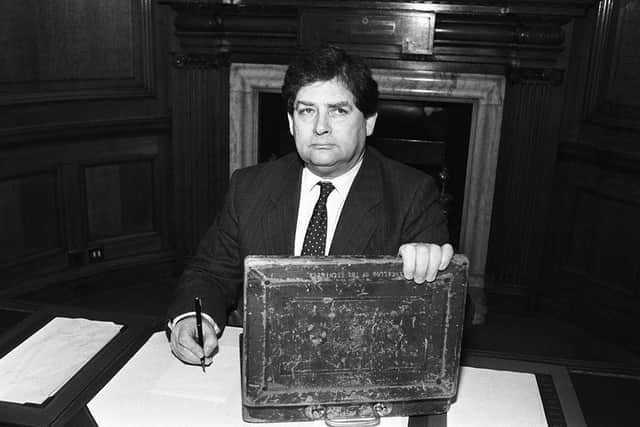Autumn Statement: Chancellor Jeremy Hunt must close capital gains tax loophole that enables massive tax dodge for the wealthy – Martyn McLaughlin
In a round of media interviews designed to dampen any expectations of rabbits being plucked out of hats, he has made no secret that pain lies ahead. There will be tax rises, severe cuts to public services, and numerous other “very difficult decisions” he has to make.
But who will have to make the biggest sacrifices, and how far will Mr Hunt go to ensure those who can afford to pay more end up doing so? From what he has said so far, it appears he is intent on raising revenues by stealth, courtesy of freezes on allowances and thresholds across income tax, national insurance, and inheritance tax.
Advertisement
Hide AdAdvertisement
Hide AdThat will help raise tens of billions of pounds and begin patching up Britain’s battered economy. But Mr Hunt can – and must – go further by targeting those who can afford to make greater contributions, and he must do so by implementing major reforms of a taxation system that is not fit for purpose at a time when the cost-of-living crisis is escalating.
The briefings that have been issued so far suggest that Mr Hunt will only go halfway. There is an expectation that he will lower the threshold at which the top 45p income tax rate becomes payable from £150,000 to £125,000. Predictably, the idea has already sparked hysteria on the right, with Mr Hunt attacked on social media as a “communist disguised as a Tory” and a “left-wing Chinese mole” overseeing “socialism by stealth”.
Such attacks will continue, yet by distancing himself from his predecessor, Kwasi Kwarteng, and the wild-eyed economics of Liz Truss – who wanted to abolish the 45p rate altogether – Mr Hunt will be able to claim that he is ensuring the wealthiest in society pay up.
According to the accountancy firm, Moore Kingston Smith, that move would lead to an additional 246,000 people paying the highest rate of tax, generating around £1.3 billion a year. It is a significant sum of money. But it is insignificant compared to the sums that could be raised via meaningful yet modest reforms elsewhere.
As is always the case with taxation issues, the devil is in the details, and those details invariably favour the wealthy. Mr Hunt’s team has already dropped broad hints that he is planning to freeze tax thresholds until 2026, or even 2028. That strategy of ‘fiscal drag’ will ensure greater receipts for the Treasury over time. Unfortunately, it also suggests that Mr Hunt is averse to making bigger changes.


He has, for example, given no indication that he is prepared to put capital gains tax (CGT) on a par with income tax. Until he does so, a major loophole which allows some of the richest people in Britain to hold onto their wealth will remain in place, and allow many individuals to avoid paying more, irrespective of any revised thresholds.
For those unfamiliar with the longstanding quirk, it allows high earners to take their annual income in the form of company stock, instead of money, which means the tax rate they pay is just 20 per cent, instead of 45 per cent. The campaign group, Tax Justice UK, has estimated that equalising CGT with income tax could bring in up to £14bn a year for the Treasury.
Significantly, it is not just economic justice campaigners who believe such a step should be taken. At the Treasury’s behest, the Office for Tax Simplification (OTS), the independent adviser to the government on simplifying the UK tax system, carried out a review of CGT in November 2020.
Advertisement
Hide AdAdvertisement
Hide AdIts report highlighted an array of concerns over the “counter-intuitive” system, warning that it creates “odd incentives” and, worse yet, creates opportunities for tax avoidance. The OTS called for the government to overhaul CGT to bring it in line with income tax. But the Treasury declined to act on its recommendations. The Chancellor at the time? The Right Honourable Rishi Sunak.
Could the Prime Minister and Mr Hunt surprise everyone by implementing such changes? It is unlikely, though not impossible, for a Conservative Chancellor to take drastic action on CGT. Back in 1988, Nigel Lawson, brought it into line with income tax at 40 per cent for higher rate taxpayers, reasoning that “it is by no means clear why one should be taxed more heavily than the other”. Some 34 years on, that observation still rings true.
One intriguing intervention in recent days has been the publication of a paper by Tim Pitt, a former Conservative special advisor, urging the party to abandon its “half-baked Thatcherism” and the failed experiment of ‘Trussonomics’. Instead, he has called on it to “raise revenue in a way that both makes the system more efficient and ensures those most able to bear the burden do so”.
Mr Pitt’s specific proposals, published by the centre-right think tank, Onward, include raising CGT thresholds in line with income tax, changing pensions tax relief for high earners, and abolishing inheritance tax relief. Pursuing even one of these strategies, let alone all three, may be anathema to many Tories, but some observers have pointed out that soon after taking office, Mr Sunak appointed Will Tanner, the founder of Onward, as his deputy chief of staff.
Of course, there is a danger of reading too much into that development, and there is every chance the same dire economic ideology of levelling up and trickling down will win out. But Mr Sunak and Mr Hunt have an opportunity to make different choices.
On Sunday, the Chancellor insisted that those with the “broadest shoulders” will bear the “heaviest burden.” Faced with a £58bn black hole, he must follow through on that promise.
Comments
Want to join the conversation? Please or to comment on this article.